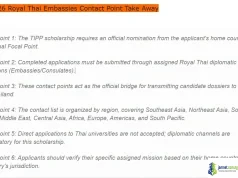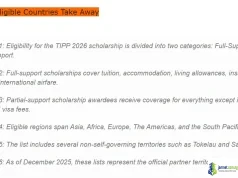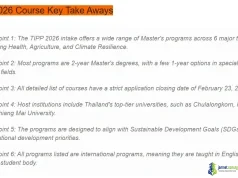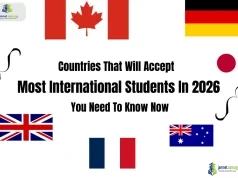Explore the benefits of a master’s degree abroad. Our guide reveals the Best top 10 reasons to study your Master’s Abroad, from career advancement to personal growth


Deciding to pursue a master’s degree is a big step, but a bigger question is whether you should do it in your home country or go abroad. You might be worried about the cost or the effort involved, but studying in a new country can be more than just an academic journey; it is a life-changing experience that can open up a world of opportunities.

Join our Telegram Channel for Instant Scholarship Updates
This guide will explain some of the powerful reasons to consider a master’s degree abroad, along with the common requirements you will need to apply.
Best Top 10 Reasons to Study Your Master’s Abroad
1. Gain Access to Top Ranking Universities
Studying abroad gives you the chance to attend some of the best universities in the world. Many institutions in countries like the United States, United Kingdom, and Canada are globally recognized, which gives your degree instant credibility. A degree from one of these top schools shows that you have been trained to a very high standard.
2. Stand Out in the Job Market
With a growing number of graduates, a master’s degree from a foreign university can make you more competitive. It shows employers that you have specialized knowledge and that you are an adaptable, independent person who can handle new challenges.
3. Access to Advanced Resources
Many foreign universities have modern laboratories, advanced research facilities, and leading professors. This exposure to cutting-edge technology and research can greatly influence your future career path and help you learn from the best in your field.
4. Build a Global Network
Your classmates will come from all over the world, which allows you to create a professional network that spans many different cultures and countries. These international friendships and connections can lead to future job opportunities and collaborations.
5. Find More Funding Opportunities
While studying abroad can be expensive, many universities, governments, and private groups offer scholarships and grants specifically for international students. In some cases, a scholarship can make studying abroad more affordable than staying in your home country.
6. Get International Work Experience
Many countries allow international students to work part-time while they study and offer visas that let you work after graduation. This is a great way to gain valuable work experience and become familiar with a new work culture.
7. Experience New Cultures
Living abroad pushes you outside of your comfort zone. By adapting to a new culture and way of life, you will grow in ways you never could at home. This builds confidence, independence, and problem-solving skills that are valued everywhere.
8. Develop Language Skills
Even if you are not studying a language, living in a new country is the best way to become fluent. Being able to speak a second or third language is a major advantage in many global industries and can open up new career paths.
9. Step into a PhD or Research Career
If you plan to continue your studies, a master’s degree abroad can be a perfect stepping stone. Many top PhD programs prefer candidates who have a foreign master’s degree and a history of working in an international academic setting.
10. Have a Life-Changing Experience
Beyond academics, studying abroad is about personal growth and new experiences. It gives you a broader perspective on the world and yourself. You will make memories and friendships that last a lifetime, shaping you into a more worldly person.
Common Requirements for a Master’s Degree Abroad
Admission requirements can be different for each university and program, but they usually include the following documents:
- Academic transcripts
- Statement of Purpose
- Letters of recommendation
- Language proficiency test scores (like IELTS or TOEFL)
- A resume or a list of work experience
- Test scores (like GRE or GMAT)
- A research portfolio (for some degrees)
- A passport or other proof of identity
Making Your Application Shine
Simply having a list of documents is not enough; you must make them stand out. Here are some tips to help you:
- Statement of Purpose: This is your chance to tell your story. Explain why you want to pursue this specific degree at this university. Share your passion, highlight your academic achievements, and show how your past experiences have prepared you for this program. Be honest and write from the heart.
- Letters of Recommendation: Choose people who know you well, such as a professor or a supervisor. Ask them in advance and provide them with your resume and a list of your accomplishments. This will help them write a detailed and powerful letter that highlights your strengths.
Overcoming Common Challenges
Living in a new country can be difficult. Here are some challenges you may face and how to handle them:
- Homesickness: It is normal to miss your family and friends. Stay in touch with them through video calls and messages. Do not hide from your feelings; instead, find new friends and get involved in activities to build a new routine.
- Culture Shock: A new culture can be overwhelming. Take the time to learn about the local customs and traditions before you arrive. Be patient with yourself and others as you adapt. Remember that it is a part of your growth.
- Loneliness: Making new friends can be difficult. Join a university club or a social group that shares your interests. Talk to your classmates and professors. Be open to new experiences, and soon you will build your new community.
Conclusion
Choosing to get a master’s degree abroad is a significant decision. It requires careful planning and a lot of preparation, but the benefits are immense. It is an investment in your career, your personal development, and your future.
By taking the time to research programs and scholarships, you can make this dream a reality and unlock a future filled with new possibilities.
Frequently Asked Questions (FAQs)
1. How much money do I need to study abroad?
The cost of studying abroad varies greatly depending on the country, the university, and your personal spending habits. You will need to budget for tuition, flights, housing, food, and health insurance. Researching the cost of living for your chosen city is an important first step.
2. Can I work while studying?
Most countries allow international students to work part-time while they are studying, often up to 20 hours per week during the school year and full-time during breaks. You should always check the specific visa rules for the country where you plan to study.
3. Do I need to be fluent in the local language?
Many master’s programs are taught in English, so you may not need to be fluent in the local language. However, learning some basic phrases will help you with daily life and with making friends. It is a good idea to take language classes before you leave home.
4. How long does the application process take?
The application process can be a long one. It is best to start preparing at least a year in advance. This gives you time to research programs, take required tests, collect documents, and write your essays.
5. What if my grades are not perfect?
Your grades are important, but they are not the only thing that matters. Admission committees look at your entire application, including your Statement of Purpose, letters of recommendation, and extracurricular activities. If your grades are not perfect, you can make your application stronger by highlighting other achievements.
6. Is it safe to study in a foreign country?
Most universities have resources to help international students stay safe. However, you should always be aware of your surroundings and take precautions, just as you would in your home country. Research the safety of your chosen city before you go.
7. How do I find housing?
Many universities offer on-campus housing for international students, which can be a good option. You can also look for private apartments or shared homes online. It is a good idea to start your housing search well in advance of your move.
8. What is a Statement of Purpose?
A Statement of Purpose is an essay that explains why you want to attend a specific program. It is your chance to tell your story, show your passion, and convince the admission committee that you are a good fit for their program.
9. How do I get a student visa?
After you are accepted into a program, the university will send you documents that you will need to apply for a student visa. The process and required documents vary by country, so you should check the official embassy website for the country you will be studying in.
10. Can I get a job after graduation?
Many countries offer post-study work visas that allow international graduates to stay for a period of time to look for a job. Getting a job can be challenging, but your international degree and experience will give you a significant advantage.













